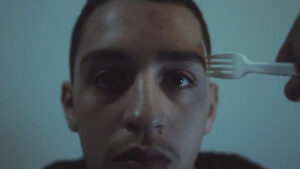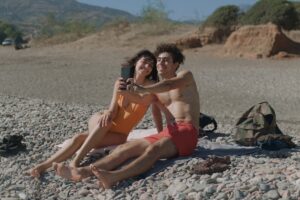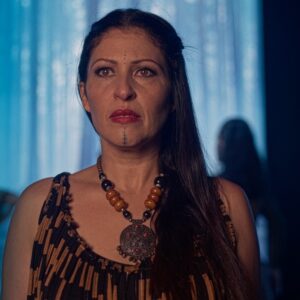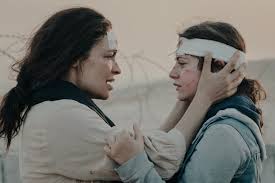One day in the future, when what transpired at IDFA this past fortnight gets documentary treatment, a voiceover might well pronounce these words: In 2023, an otherwise meditative annual event that provides glimpses of real life on multiple screens was itself invaded by the raucousness of real life.
The invasion began when Orwa Nyrabia, the festival’s ebullient and well-liked director, offered mild applause at the end of a surprise pro-Palestine protest on opening day. Hours later, that gesture had been magnified by some members of the media and a group of Israeli filmmakers into the kind of kerfuffle that usually ends with someone getting defenestrated from his position by an angry board of trustees.
This meant that, throughout the festival, there was an underlying tension in the air — and a few questions. After major screenings, filmmakers gathered at the Tuschinski cinema. the Pathé and elsewhere. What was the latest? Was Nyrabia’s head on the chopping block? The uncertainty was given an extra layer of complexity when pro-Palestine filmmakers began to withdraw their films.
But IDFA is a big festival. It can survive such withdrawals. What was harder to survive was the politics that placed it squarely in the middle of a long-running fight. In trying to please both sides, it had annoyed both. Night after night, at Café Kuyl, the festival’s famous watering hole, documentary stakeholders expressed their anger at an IDFA statement condemning the use of the slogan “from the river to the sea” as its response to the pro-Israel group. It was an unnecessary statement, they said. IDFA should have waited. “This is our Cannes,” one stakeholder said, suggesting that the community of documakers would have supported the festival if matters came to a head. According to this theory, IDFA just needed to be silent.
But silence hardly seemed ideal, given the bloodthirsty headlines and reports in the trades. Obviously, both sides of the conflict had found a scapegoat in IDFA. Unable to dictate the terms of the real Gaza conflict happening far away, these filmmakers and stakeholders were exercising their power over the one institution that actually listens to them. It might have been prudent to support IDFA’s call for a ceasefire but, in times like the present, reason frequently goes missing.
The festival’s selection of films had no such deficit of gumption. Across sections, the selection reflected the present turmoil in a deeply probing manner, often reaching across time and geographies. Two big awards for the International Competition section went to films about the personal costs of war. Mohamed Jabaly won the Best Director award for Life Is Beautiful, which describes how Jabaly finds himself trapped in Norway when the Gaza border is closed. He is told to fill out a form that doesn’t include his home country, Palestine.
A relatively costlier loss is at the heart of Shoghakat Vardanyan’s film 1489 which was named Best Film on awards night. The director investigates the disappearance of her brother after he joins the Armenian army as the country battles Azerbaijan. Vardanyan’s film also won the FIPRESCI award.
That success highlights what a terrific year it was for films from the Caucasus. From Georgia came Limitation, a film about the ousting of one of country’s leaders in the 1990s. A true feat of editing and resourcefulness, the film was cobbled together from material found entirely online. Somehow, its makers got the obtained footage into what seems like near-chronological order.
In the festival’s experimental Envision section, Canuto’s Transformation by Ariel Kuaray Ortega and Ernesto de Carvalho took the Best Film and the Outstanding Artistic Contribution awards. The section’s directing award was won by Kumjana Novakova, whose Silence of Reason presents accounts of women raped during the Bosnian War. The Reframe Award, which focuses on the use of archival material, was won by Selling A Colonial War, yet another film about war but from a public relations perspective. The Netherlands’s brutal adventure in Indonesia takes centre-stage in this impressive documentary.
As The Tide Comes In, about life on a small island off the coast of Denmark, was another notable picture. A beautifully crafted film, full of visual poetry and colourful characters, it offers commentary on climate change and community. On the notable but bizarre end was Thunska Pansisvorakul’s Damnatio Memoriae, a crazy but melodiously edited film in the Envision section. Filled with graphic images of violence and pornography, it is an interestingly shocking montage of atrocities committed across the world. Only viewers with strong stomachs need apply.
At past editions of IDFA, its award winners enjoyed a big party in a city known for its boisterous nightlife. But this year, on the night before the awards, a message went out to jury members and other attendees: the celebrations will be muted. No party; just drinks.
It wasn’t explicitly stated but it was easy to work out the festival’s motivation for staging a smaller event. The opening night had taught everyone a lesson in how implacable both sides of a conflict can be. If innocuous applause could cause so much trouble, why provide grounds for a repeat?
In his welcome speech on the awards night, Nyrabia announced that IDFA would organise a symposium to discuss how cultural bodies might navigate the tricky terrain of political conflict. The details were unclear but, going forward, they should be less so. “Growth, pain, we have to go through it and move on to a new understanding,” Nyrabia said, speaking at the International Theatre Amsterdam venue.
Whatever anyone thought about the festival’s decision, the subdued format of the ceremony worked. No one in the audience shouted any of the slogans that have dominated social media and made news headlines in the Gaza debate. No banners were hoisted. Nobody booed or stormed off in anger. Some of the juries reflected on the events of the preceding days but their criticisms were more measured than dramatic. Rwandan director Kivu Ruhorahoza mentioned fellow director Basma al-Sharif, who was initially a member of the Envision jury but who pulled out after IDFA’s response to the Israeli statement, yet his words were more conciliatory than inflammatory.
Days before the awards night, one jury member said she saw Nyrabia looking pale following news of filmmakers pulling their films. On the night itself, his usual ebullience wasn’t fully back but all traces of pallor had disappeared. When he hugged his personal assistant at the end of the awards, it seemed like the men were communicating relief as well as joy to each other. Was his head on the chopping block? It certainly didn’t seem so.

.png)






Very interesting topic, regards for putting up.Raise your business